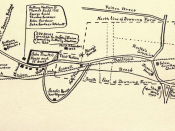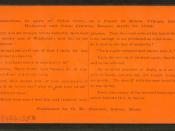John Proctor is a man destined to hang for witchcraft. The case itself is absurd, and the incongruous evidence does not prove that he had committed witchcraft. One might even argue that there is no such thing as witchery, but nevertheless, John Proctor has been accused and is destined to die. However, a door opens, and a hand is offered. John Proctor can evade death and continue to live with his wife and two children. All he must do is sign his name on a piece of paper decreeing that he did commit the crime of witchery. After all, he knows he was falsely accused in the first place. What harm is there to give the accusers another lie? He has reconciled with his wife, and their future is full of promise. Neither wants the other to go, and by living, Procter can do much more good in the world.
He can take care of his children, nurture a loving wife, and continue to denounce the preposterous suggestion of witchcraft.
The bible states that suicide is a sin, and Proctor is given a choice, to live or to die. Isn't choosing to die suicide? Proctor would sign the confession, and Danforth would have his excuse to hang Goody Nurse. There is nothing wrong with Proctor's actions. Either way, Nurse would die. The only difference would be whether or not Proctor dies. Proctor labels himself as a martyr if he is sacrificed, but is his sacrifice worth it? Proctor aims to become a martyr for his own, selfish reason, to be at peace with himself for realizing that he has "some shred of goodness [left]" (144) in a body filled with wretchedness. Proctor should take the lifeline offered to him and save himself, condemning those "witches" accused before and after himâ¦or should he?Would any sane man be so selfish as to save his own hide while potentially leaving the hides of many friends to hang? Any who does so can only be labeled as a greedy, sycophantic coward. John Proctor is not a coward, nor is he greedy. To be saved from sure death is tempting, perhaps as tempting as the forbidden fruit to Eve? But to save oneself for one's own, selfish cause is immoral. John Proctor must stand firm in his sense of truth and be willing to die for truth and goodness. John Proctor was falsely accused of witchery, and he knows himself that he is no witch. To a point, Danforth, the Judge who condemns many in Salem as witches, knows that many are wrongly accused. Still, he cannot back out without losing face. The system of lies and deception engulfs Salem. Must John Proctor, a good man who understands his own sins, be ensnared in the lies? NO! By giving out his signed confession, John is lying to himself and to God. It is truly the devils argument that John should lie and condemn others just to save himself. Thus, John Proctor should not give into the darkness. Proctor cannot live with himself if he "gives them such a lie. It is evil," (138). By standing firm in truth, Proctor knows that his soul is pure.
If Proctor were to truly save himself, his action would show that he is a coward, unfit to become a great man. A coward will not, cannot do much good in the world should he keep living. Proctor will not live a happy life with his wife and sons. His cowardly nature will prevent him from denouncing witchcraft. The argument that, were he to live, he could continue on his path of redemption holds no water. Simply, the truth of one's nature will always affect one's actions.
The Bible does state that suicide is a sin, a meaningless waste of a life that God has blessed to walk the earth. The key word is meaningless. Is it meaningless if by sacrificing one person's life, many lives can be saved? Is it meaningless if, by the choice of John Proctor, no more people will be convicted of witchcraft, a false crime? John Proctor is not committing suicide. Instead, God looks with favor upon John's action to stand firm for truth. Physically, the only difference between John confessing to witchery and John not confessing is the death of one more individual. However, people will view John's actions beyond a physical level. If John confesses to save himself, some would look with disgust at him while others would know that it was because of John that Goody Nurse was hung with good reason. If John confesses, his name would be marred in Salem, and he would have to live with his immoral decision for his life. To live with making the moral decision is best. But if that result is not possible, it is better to die for a moral decision than it is to live for an immoral one.
John Proctor should not confess and should keep firm in his morally righteous path, even if it means he is to be hanged. True, he will die a martyr, but it will not be selfish reasons. John is tempted with confession, and were he to choose that course, it would have been for selfish reasons. However, John made the decision to not give his accusers his confession, a much harder decision based upon the righteousness of himself as a human being. John will sacrifice his life for those wrongly accused who came before him, comes along with him, and will come after him. One who sacrifices his life in such a way is, by definition, completely unselfish. Thus, John, by refusing to confess and save his own life, will live on in the memory of many, becoming a martyr who died for unselfish reasons.
When taken into account the views one can have upon making a decision regarding life and death as such John Proctor must make, it seems overwhelming, too complex for a person to make a decision at all. And yet, all of us can make the decision that John Proctor makes if circumstances dictate. We make such an important decision based upon our character and our conscience. Those with weak character might value life. However, Proctor is an individual of strong character and good conscience (despite his own doubt of goodness for having committed adultery). Proctor must make the decision to follow a morally correct path, refuse confession for crime he did not do, and if need be, hang for righteousness.
BibliographyMiller, Arther. "The Crucible." Dramatists Play Service, Incorporated, 1953.





